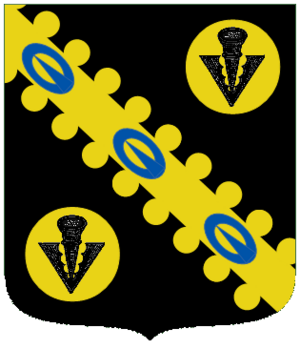William Stubbs facts for kids
Quick facts for kids The Right Reverend William Stubbs |
|
|---|---|
| Bishop of Oxford | |

Portrait by Hubert von Herkomer, 1885
|
|
| Diocese | Oxford |
| In Office | 1889 to 1901 |
| Predecessor | John Mackarness |
| Successor | Francis Paget |
| Other posts | Regius Professor of Modern History (1866–1884) Bishop of Chester (1884–1889) |
| Orders | |
| Consecration | 25 April 1884 |
| Personal details | |
| Born | 21 June 1825 Knaresborough, England |
| Died | 22 April 1901 (aged 75) Cuddesdon, England |
| Buried | All Saints, Cuddesdon, Oxfordshire |
| Nationality | British |
| Denomination | Anglican |
| Spouse | Catherine Dellar |
| Education | Ripon Grammar School |
| Alma mater | Christ Church, Oxford |
William Stubbs (21 June 1825 – 22 April 1901) was an English historian and Anglican bishop. He was Regius Professor of Modern History at the University of Oxford between 1866 and 1884. He was Bishop of Chester from 1884 to 1889 and Bishop of Oxford from 1889 to 1901.
Contents
Early life
The son of William Morley Stubbs, a solicitor, and his wife, Mary Ann Henlock, he was born in a house on the High Street in Knaresborough, Yorkshire, and was educated at Ripon Grammar School and Christ Church, Oxford, where he graduated MA in 1848, obtaining a first-class in Literae Humaniores and a third in mathematics.
Education and career to 1889
Stubbs was elected a Fellow of Trinity College, during his time living in Navestock, Essex, from 1850 to 1866, where he served as parish priest for the same period.
In 1859, he married Catherine Dellar, daughter of John Dellar, of Navestock, and they had several children. He was librarian at Lambeth Palace, and in 1862 was an unsuccessful candidate for the Chichele Professorship of Modern History at Oxford.
In 1866, Stubbs was appointed Regius Professor of Modern History at Oxford, and held the chair until 1884. His lectures were thinly attended, and he found them a distraction from his historical work. Some of his statutory lectures are published in his Lectures on Mediaeval and Modern History. In 1872, he founded Oxford University's School of Modern History, allowing postclassical history to be taught as a distinct subject for the first time. He accepted the patronage of the Stubbs Society during his time at Oxford, where he interacted with future doyens of the historical profession.
Stubbs was rector of Cholderton, Wiltshire, from 1875 to 1879, when he was appointed a canon of St Paul's Cathedral. He served on the ecclesiastical courts commission of 1881–1883 and wrote the weighty appendices to the report. On 25 April 1884 he was consecrated Bishop of Chester, and in 1889 became Bishop of Oxford until his death. As Bishop of Oxford he was also ex officio the Chancellor of the Order of the Garter. He was a Member of the Chetham Society, and served as vice-president from 1884.
Approach to church office
Stubbs was a High Churchman whose doctrines and practice were grounded on learning and a veneration for antiquity. His opinions were received with marked respect by his brother prelates, and he acted as an assessor to the archbishop in the trial of Edward King, Bishop of Lincoln.
Final illness and death
An attack of illness in November 1900 seriously impaired Stubbs's health. He was able, however, to attend the funeral of Queen Victoria on 2 February 1901, and preached a remarkable sermon before King Edward VII and the German Emperor Wilhelm II on the following day. Stubbs's illness became critical on 20 April. He died in Cuddesdon on 22 April 1901. Stubbs was buried in the churchyard of All Saints, Cuddesdon, next to the palace of the bishops of Oxford.
Honours and degrees
Both in England and America, Stubbs was universally acknowledged as the head of all English historical scholars, and no English historian of his time was held in equal honour in European countries. Among his many distinctions he was D.D. and honorary D.C.L. of Oxford, LL.D. of Cambridge and Edinburgh, Doctor in utroque jure of Heidelberg; an hon. member of the University of Kyiv, and of the Prussian, Bavarian and Danish academies; he received the Prussian order Pour le Mérite, and was corresponding member of the Académie des sciences morales et politiques of the French Institute. Stubbs was elected a member of the American Antiquarian Society in 1897.
Modern views of him
In the main Stubbs's ideas of a confrontational political framework have been superseded by K. B. McFarlane's "community of interest" theory; the idea that the amount of possible conflict between a king and his nobles was actually very small (case in point, Henry IV, 1399–1413). Historians like Michael Hicks, Rosemary Horrox and notably May McKisack, have pushed this view further.
J. W. Burrow proposed that Stubbs, like John Richard Green and Edward Augustus Freeman, was an historical scholar with little or no experience of public affairs, with views of the present which were romantically historicised and who was drawn to history by what was in a broad sense an antiquarian passion for the past, as well as a patriotic and populist impulse to identify the nation and its institutions as the collective subject of English history, making
the new historiography of early medieval times an extension, filling out and democratising, of older Whig notions of continuity. It was Stubbs who presented this most substantially; Green who made it popular and dramatic... It is in Freeman...of the three the most purely a narrative historian, that the strains are most apparent.


